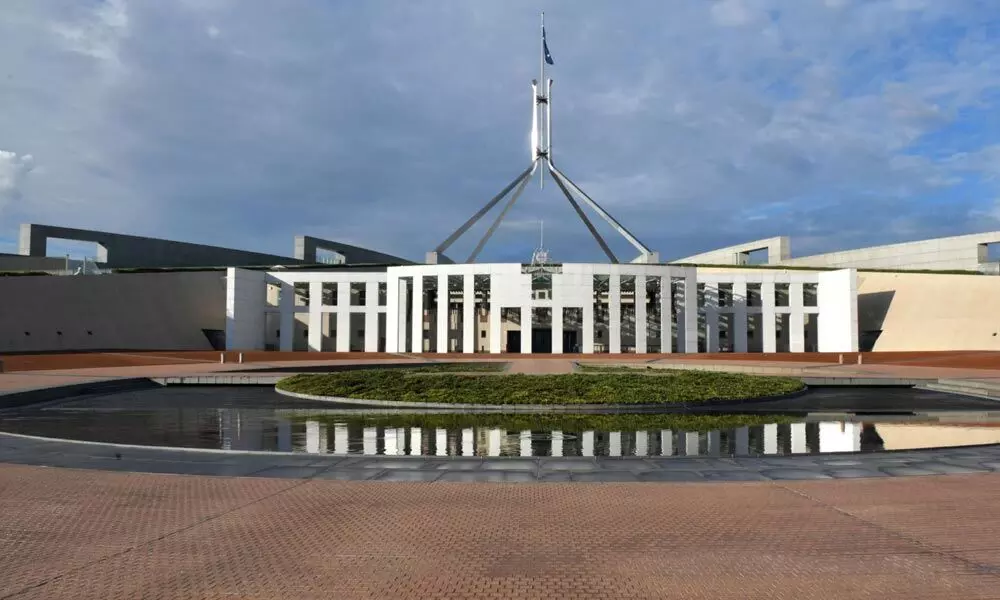Australia's sex scandals signal a political culture more toxic than US
It’s especially true of Parliament House, which has become ground zero for scandal. Not only do lawmakers and their aides have offices there, but cabinet ministers - even the prime minister - govern from its rooms. It’s where major media outlets base their coverage. This fuels a hot-house atmosphere charged by late nights, a few neighborhood watering holes and grand personal ambition
image for illustrative purpose

WHEN a protégé of Frank Lloyd Wright won a global contest to design Australia's national capital, a den of iniquity likely isn't what he imagined. In the century since its inception, Canberra has become a byword for sleaze and a swamp of lurid politics. It's a far cry from the geometrically perfect hillside city that Chicago architect Walter Burley Griffin set out to build.
At first blush, it's hard to see how the decision to locate Australia's capital in a lonely, sheep-grazing stretch of farmland between Sydney and Melbourne would have anything to do with the series of sex scandals bedeviling Prime Minister Scott Morrison's government. Yet the city's remote and humble beginnings meant that, historically, few consequential figures had any roots in the region where they lived and worked. Canberra thus became a bubble, detached from morals and norms of behavior. This explains, in part, how its poisonous culture took root.
I grew up in Canberra and often defended it against the criticisms of talk radio and right-wing editorials, which described it as a city that was out-of-touch and full of pampered bureaucrats. That view dismisses the extremely hard work of many career civil servants, who toil behind the scenes for relatively modest salaries, my parents among them.
Lately, though, Canberra has been hard to defend. Barely a day passes without some new charge of licentious behavior. Last week, the defense minister was moved from her post after mishandling allegations that a staffer was raped in her parliamentary office. The former attorney general is suing the state-funded Australian Broadcasting Corp. for defamation after a report alleging he raped a woman in the 1980s, something he vigorously denies. He has been shuffled to another post. The Ten Network recently broadcast allegations that a group of male staffers shared lewd images and videos for two years, including photos of one of them masturbating on the desk of a female lawmaker. The standing of Morrison's government, clinging to wafer-thin support in parliament, has taken a hit. For his part, the premier says it's unacceptable and that he is sickened by the revelations.
As well he should be. But I am skeptical he was totally surprised. The type of behavior that has transpired is endemic to Canberra's inner circles. That's especially true of Parliament House, which has become ground zero for scandal. Not only do lawmakers and their aides have offices there, but cabinet ministers - even the prime minister - govern from its rooms. It's where major media outlets base their coverage. This fuels a hot-house atmosphere charged by late nights, a few neighborhood watering holes and grand personal ambition. Many staffers aspire to become legislators themselves or eye still higher office.
Washington insiders might smirk at how familiar this all sounds. I worked there for a decade and recognise it has many of the same ingredients. But DC is much more decentralised than Canberra. Cabinet members work from their department buildings. News organisations have their headquarters spread around town. Washington is older and the capital area has about six million people, many of whom are plugged into happenings in other parts of the country. Canberra has close to 4,00,000, few of whom live beyond the city borders. Washington can be parochial, but compared with Canberra, it's worldly.
You might be tempted to argue that the city's separation from regional politics — as well as the competing claims of business, finance, labor and agriculture — is a benefit. In practice, however, this has resulted in a detachment from economic reality. It's also very tricky to fire career civil servants, and only voters can dispatch members of parliament. In time, key parts of Canberra became populated by an insular group of transitory people, who work in close proximity all hours of the day and night.
What you're left with is a vast gap between people at the top echelons of government and the worker bees that make it function. That army of civil servants and military officers who occupy Canberra's suburbs are agog. Many just try to live their lives and raise their families. Most Canberrans would just as happily spend their time discussing the Raiders, the local rugby league team, or bushfires that scarred hamlets on the south coast of New South Wales, where many spend their vacations.
From time to time, people ask me where I am from in Australia. I usually get a certain look when I reply, and have felt the need to quickly add that I haven't lived there in decades. This response speaks volumes about the low regard Canberra held in relative good times. Now, it's surely worse.
When I was a boy, Lake Burley Griffin, a man-made lake named for the architect, became infested with European carp. Tales, possibly apocryphal, abounded of stick-fetching dogs who ventured into the waters only to get hunted down by these terrifying creatures. The Canberra Fisherman's Club hosts an annual "Carp Out" day where residents cram the sides of the lake to fish out its pests. Though this picturesque body of water, around which many federal buildings cluster, looks pristine from afar, locals know all too well that infestation lurks just below the surface. The same might be said about the city around it. (Bloomberg)

